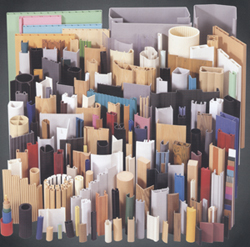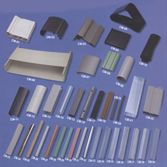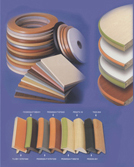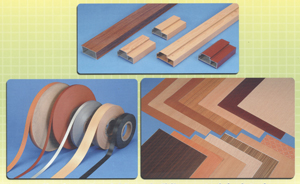Taiwan's Suppliers of Extruded Plastic Items and Trims Remain Competitive
2009/10/07 | By Judy Li
Backed by readily available upstream supply of plastics and metals as steel, Taiwan’s manufacturers of extruded plastic items, metal extrusions and decorative plastic sheets, as well as specialty surface finishers can remain competitive by providing a wide variety of such items that are innovative and high-end.
In addition to stable material supply, these manufacturers in Taiwan also benefit from a network of metal and plastic processing plants, whose years of experience helps to offer subcontract manufacturing services as necessary, to turn out OEM, ODM and made-to-order products for global buyers.
Dah Shan Plastics Co., Ltd.
After nearly two decades, Dah Shan Plastics Co., Ltd. has evolved into a specialist maker of decorative plastic extrusions for household applications, materials and parts for construction, furniture and medical equipment.
With a modern factory in Taichung, central Taiwan, of about 36,000 square feet, the firm runs 15 production lines extruding specialty plastic products of both soft and hard plastics. “We use various plastics, including ABS, HIPL, PE, PP, PVC, PS, NBR, TPE, TPR etc. to make products meeting different demands in terms of colors and surface finish,” says Tsai Teng-fang, the general manager.
“Due to rising eco-protection globally, it’s increasingly difficult for us to obtain virgin wood, so we adopt plastics to replace natural wood,” Tsai explains. “High technology helps to make plastics simulating natural-woods, but better for its waterproof, antiseptic and insect-proof merits.”
Extruding plastic products up to 122 mm wide and 0.3 mm to 18 mm thick, Dah Shan supplies bumper strips, fiberglass-reinforced-plastic tubes, electric wire molds, baseboards, cupboards, racks, cabinets, computer desks, office furniture parts, drawer parts, edging, doorframes, roller shutters, etc.
Better at Home
“Seeing many furniture makers move production offshore, I also considered following suit, ” Tsai confesses. “However, after assessing the manufacturing environment in China, Indonesia and the Philippines, I finally decided to stay put since I am familiar with the manufacturing environment on the island, and can better control everything.”
Dah Shan makes products for all kinds of industries, with furniture being just one, which absorbs only one-tenth of the company’s output. “Most of our raw materials are locally sourced except for some specialty chemicals being imported from Japan and Italy,” Tsai says.
“The surging price of crude oil internationally in recent years has also driven up prices of plastics. Having to absorb most of the doubling this year of the price in plastic materials, our profits will unquestionably be thinner,” Tsai worries.
Currently Dah Shan sells half of its products in Taiwan and the remaining to Europe and Japan. “Our buyers in Italy and the U.K. place fairly steady OEM orders. And we plan to tap the market in the United States in the near future,” Tsai says.

Ching Mnh Plastic Co., Ltd.
Established in 1984, Ching Mnh Plastic Co., Ltd. specializes in extruding plastic tubes and strips. “We also handle the tooling to extrude plastic products, which are mainly of PVC, ABS, PP, PE, TPR etc.,” says Yang Chin-ming, the sales manager. “We source plastic materials from the major local suppliers, as well as import specialty materials and chemicals from Japan and the U.S.”
The company extrudes strips up to 700 mm wide as well as a variety of decorative strips in different sizes and patterns. A sample of the product line includes T-shaped strips, table edging, aluminum foil decorative strips, OA furniture molding, screen partition molding, L-shaped molding for treadmills, automotive protective and decorative molding etc.
This maker has also suffered from rising plastic material prices due to surging crude prices, which have compromised corporate profits in the past two or three years, with last year’s revenues tumbling by 50%-60%, according to Yang.
The uncertain global economy and unrelenting competition from China and Southeast Asia have severely undermined Taiwan’s extruded plastic industry, forcing many to move production offshore or simply quit. “Ching Mnh, with a modest workforce of 20-30 persons, is too small and financially weak to relocate overseas,” Yang admits.
“Nevertheless, a small enterprise can easily adjust to cope with ever-changing markets to stay afloat amid worsening manufacturing environment,” Yang remarks. “The key to staying competitive is to offer quality, prompt delivery and reasonable prices. Since our firm depends on automated production, so we import advanced machines to turn out better quality products, which are world-standard certified.”
Ching Mnh sells 70% of its products in Taiwan and exports the remaining to China and Southeast Asia. “We stay away from cut-throat competition, so we usually produce high-end items in relatively small volume to achieve higher margins,” Yang adds. “To head off rivals, we are committed to R&D to roll out more innovative items.”
Also this modest-sized supplier looks to expand exports by tapping the markets in the Middle East and North Africa in the near future.

Taiwan Hwan Yi Industries Co.
Despite hardship caused by the global downturn, a few manufacturers making decorative parts and trims for various household items have been unfazed. One such supplier who has fared well is Taiwan Hwan Yi Industries Co.
Established in 1981, Taiwan Hwan Yi uses integrated production to enhance product quality. Initially, the company concentrated on plastic and aluminum trims for electronic products. Later on, it added machine tools to turn out polyvinyl chloride (PVC) trims for PC tables, coffee tables, cabinets and corner posts.
Ten years ago the company set up a factory in Chungli, in the northern Taiwan county of Taoyuan, to produce doors, profiles, skirt trims, photo and picture frames, among other items.
Its present range includes five categories: PVC edging, finished doors, wall seal profiles, aluminum profiles, roller-shutter slats, and T-shaped profiles; baseboard, ceiling profiles, and decorative trims; picture frames; windshield molding; and bicycle fenders and mudguards.
The T-shaped profiles may be installed on office furniture, bedroom furniture, and dining tables, especially PC desks, conference tables, and dining room accessories. Melamine resin-impregnated decorative paper and medium density fiberboard are imported from Germany to ensure the high quality of these products.
“Our products are versatile, suitable for furniture as well as auto vehicles,” says Chiu Cho-ten, president of the company. “For instance, our extruded edging, available in thickness of 0.45-6 mm and width of 12-44 mm, may be applied to wooden knockdown furniture, kitchenware, OA furniture, advertising signs and as decorative strips.”
“Our products are durable and available in various colors,” Chiu emphasizes. “We fill OEM orders and accept special orders for total solutions. Besides, we have already built our own brand—Lite Max, which is well-known.”

Thai Chi Enterprise Co.
Located in southern Taiwan, Thai Chi Enterprise Co. specializes in surface print finishing, surface finishing materials as laminate strips and veneers, and related processes, having built a solid reputation for high quality and prompt after-sales service.
“The company was set up by my father about 13 years ago,” recalls Hsu Hung-shen, now the vice chairman and general manager. “He suffered all kinds of problems to establish the company all by himself, having traveled abroad alone to explore overseas markets to face a lot of frustrations. But years of hard work have finally built a stable pool of clients to make our work easier today.”
Thai Chi specializes in wood-grain printing and special finishes, mainly for furnishings, building materials, interior decorations, kitchen fixtures, ceiling panels, and speaker boxes. Its laminate strips and other finishing materials are made mostly of paper, PVC, PP etc. The company currently turns out monthly about 4.5 million meters of paper-made products, 700,000 meters of PVC products, and 100,000 meters of PP products.
“Another vital step in successful surface finishing is ink mixing,” Hsu notes. “It’s not easy to mix printing ink to achieve the right color, so we only trust experienced personnel to do the mixing. In addition, precision measuring device is also indispensable.”
About 20% of Thai Chi’s products are distributed in Taiwan and the rest are exported, mainly to Japan, the U.S., China, Malaysia, Indonesia, and the Philippines.
Eco-friendly Materials
“To keep up with world trends we started using eco-friendly materials in 2003,” Hsu reports. “As a result, our products are free of toxic substances as lead, hexavalent chromium and mercury, and are ever more welcome in the increasingly eco-sensitive global market.” The company’s efforts to improve technology, upgrade quality, and enhance operating efficiency were recognized by becoming ISO 9001 and ISO 14001 certified in 2005.
“We have about 70-80 workers on the production lines,” Hsu adds. “We don’t need too many employees due to total computerized automation, which enables our plant to run 24 hours a day.”
Besides mapping out plans to develop sophisticated mirror-coating technology for high-end items as speaker boxes and TV stands, Thai Chi also will continue cultivating existing markets and tapping markets in Europe, the Middle East, and Latin America.




